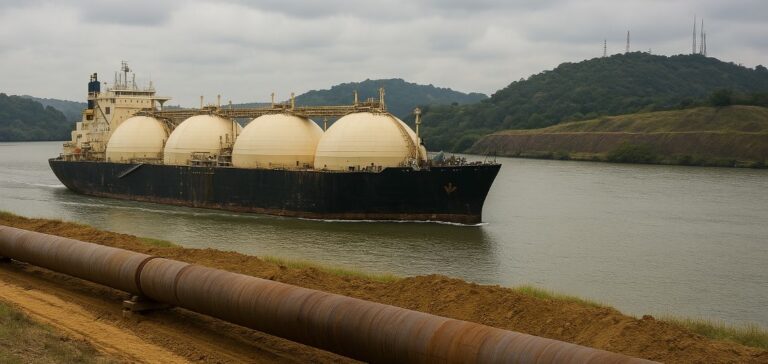The Panama Canal Authority (Autoridad del Canal de Panamá, ACP) approved on April 4 the launch of a public tender for the construction and operation of an 80-kilometre gas pipeline crossing the isthmus. The project aims to transport liquefied petroleum gas (LPG) from the Panamanian Caribbean coast to the Pacific side, facilitating its re-export to Asia. This new infrastructure reflects the ACP’s strategy to diversify its logistical and energy operations.
The LPG would be primarily imported from terminals on the eastern coast of the United States, then transferred by ship to Panama before being transported through the future pipeline. The initiative, which includes private sector participation, addresses constraints related to the limited canal capacity for certain gas carriers. An existing oil pipeline currently moves crude in the opposite direction across the isthmus, but it is not operated by the ACP.
Energy interests and geopolitical pressure
The announcement comes less than a month after the ACP publicly disclosed its intention to develop an interoceanic LPG transport infrastructure. According to Ricaurte Vásquez, ACP Administrator, global LPG demand is rising sharply and is expected to double over the next decade, positioning the project as a strategic conduit for energy flows. However, this commercial orientation raises questions about potential conflicts of interest between national sovereignty and foreign influence.
The political context surrounding the project has been heightened by recent statements from United States President Donald Trump, who suggested reconsidering Panamanian control over the canal. Originally built by the United States and handed over to Panama in 1999, the canal remains a critical junction for global energy trade, increasingly subject to commercial, security, and diplomatic pressures.
Autonomous governance and balancing influence
The ACP, an autonomous public body, retains full authority over canal operations and related projects. However, the gas pipeline tender introduces a scenario in which the management of major energy infrastructure could attract international operators with distinct strategic interests, making the selection process particularly sensitive.
The nature of the project, structured around energy transit between the Americas and Asia, highlights ongoing challenges in balancing foreign investment openness with national control. The ACP has yet to release a detailed timeline for the tender or the selection criteria for potential operators.





















